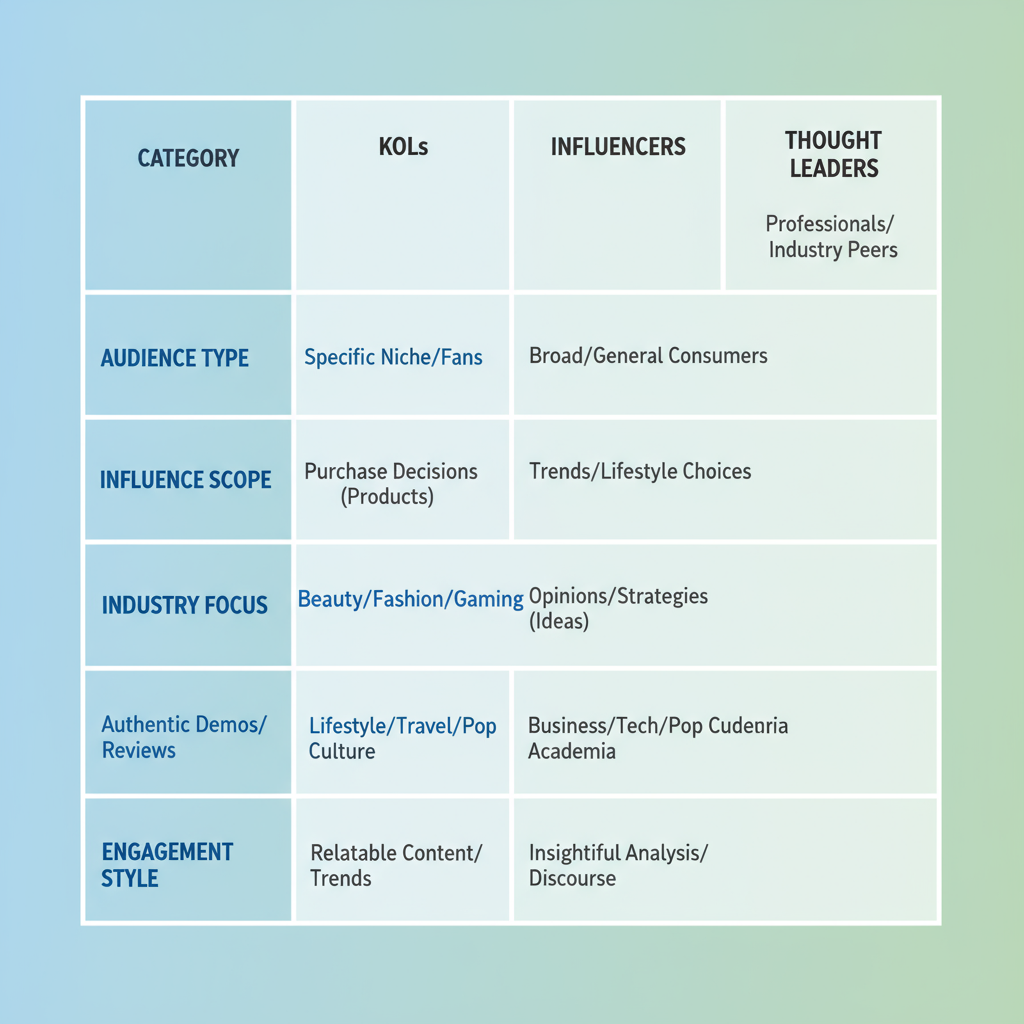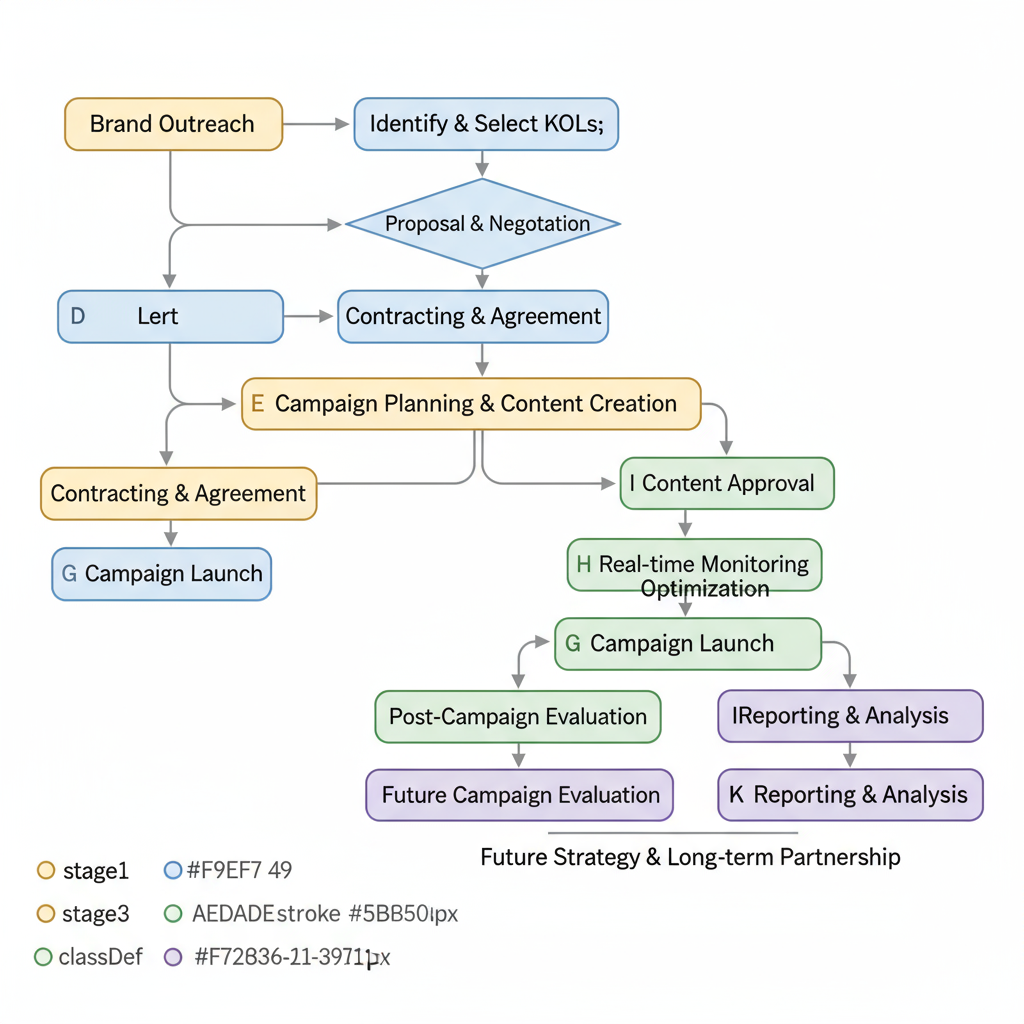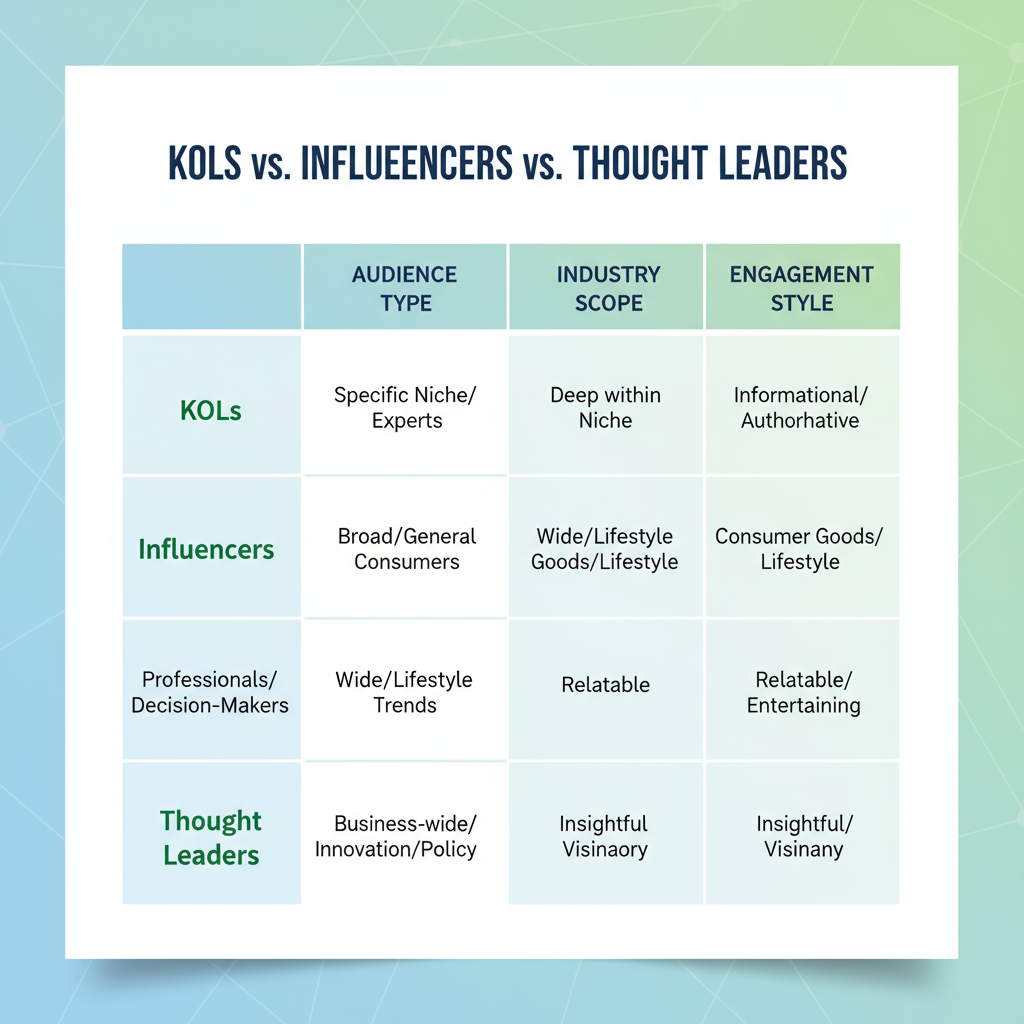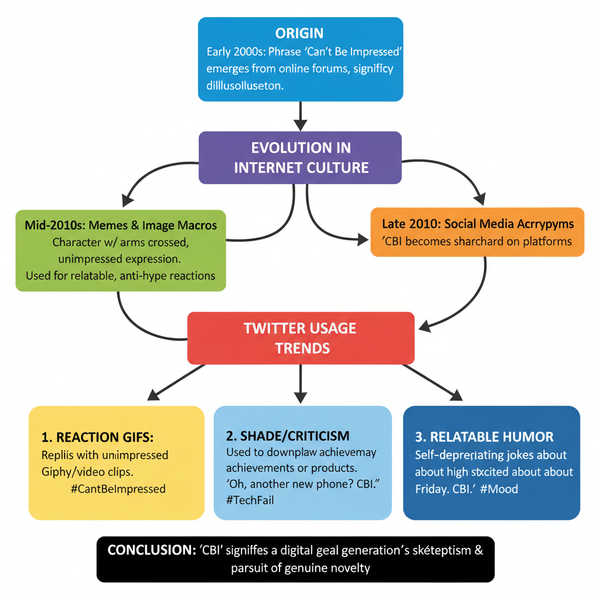Define KOL in Marketing: Meaning, Roles, and Benefits
Learn what a Key Opinion Leader is in marketing, how they differ from influencers, their roles across industries, and the benefits of brand partnerships.

Introduction to KOL (Key Opinion Leader) in Marketing
In today’s competitive marketing landscape, understanding the definition of a KOL (Key Opinion Leader) is critical for brands aiming to build trust and influence. A KOL is an individual whose recognized expertise, authority, and credibility in a particular niche allow them to shape opinions and guide consumer decisions. Whether in healthcare, technology, fashion, or finance, these authorities offer insights that their loyal audiences trust implicitly.
Unlike general influencers who depend mainly on popularity and engagement metrics, a KOL’s power lies in professional accomplishments, qualifications, and proven industry knowledge. This distinction makes them invaluable partners for precise and impactful marketing campaigns.

---
Origin and Evolution of the KOL Concept
The concept of KOLs first emerged within healthcare and pharmaceuticals. Early KOLs were doctors, researchers, and scientists who influenced clinical decisions, educated peers about new treatments, and contributed to public health awareness. Pharmaceutical companies often engaged these experts to share research findings and endorse innovative medical products.
As communication channels expanded, the KOL model spread into other sectors—including technology, fashion, finance, lifestyle, and education. Professionals with specialized knowledge began to impact decision-making both online and offline, with social media amplifying their reach and creating a new wave of industry-specific authorities.
---
Difference Between KOLs, Influencers, and Thought Leaders
The terms “KOL,” “influencer,” and “thought leader” are often used interchangeably, but they have distinct meanings:
| Aspect | Key Opinion Leader (KOL) | Influencer | Thought Leader |
|---|---|---|---|
| Primary Strength | Expertise & Authority | Reach & Engagement | Innovative Thinking |
| Audience | Niche-specific, trust-based | Mass audience, trend-oriented | Industry peers & decision-makers |
| Platform | Mixed (online/offline) | Primarily social media | Conferences, publications |
| Credibility Source | Professional background | Popularity & relatability | Forward-looking insights |
While overlap can occur, the KOL’s value derives from demonstrated expertise, not solely digital presence.
---
Key Characteristics of an Effective KOL
An impactful KOL generally possesses:
- Deep, specialized industry knowledge supported by qualifications and experience.
- Exceptional communication skills to deliver complex points clearly.
- Authenticity and belief in the ideas or products they recommend.
- A loyal audience that values their expertise over trends.
- Ethical integrity, ensuring transparency and honesty in advocacy.

---
Roles KOLs Play in Different Industries
KOLs adapt to the needs of their sectors:
- Healthcare: Sharing clinical research, training practitioners, guiding patient advocacy.
- Technology: Delivering informed product reviews, consulting on enterprise adoption.
- Fashion: Influencing seasonal styles, curating trend-led editorial content.
- Finance: Providing data-driven market analysis and investment recommendations.
- Education: Advocating for innovative curricula and teaching methods.
---
Benefits of KOL Collaboration in Brand Marketing
Working with a KOL can help brands achieve:
- Trust Transfer – credibility passed from KOL to brand.
- Targeted Visibility – access to niche, highly relevant audiences.
- Content Authority – expert explanations enhance perceived value.
- Sustained Impact – influence that extends beyond a single campaign.
- Enhanced PR Opportunities – potential coverage in industry media.
---
How KOL Partnerships Operate
KOL collaborations can include:
- Compensation models: Retainers, one-off fees, equity options, or product exchanges.
- Contractual scope: Specific deliverables, timelines, exclusivity rights.
- Compliance: Disclosure of sponsored content and adherence to advertising regulations.
Successful partnerships align brand objectives with the KOL’s subject matter expertise and audience interests.
---
Examples of KOL Campaign Success
- Healthcare: A diabetes specialist partners with a pharma company, presenting research findings in reputable journals and at medical summits.
- Technology: A cybersecurity analyst’s expert review prompts C-suite leaders to adopt a new enterprise platform.
- Fashion: A style consultant curates a high-end brand’s runway show, influencing upcoming seasonal collections.

---
Risks and Challenges in KOL Engagement
Partnerships are not without potential drawbacks:
- High Costs due to their industry standing.
- Limited Availability for repeated engagements.
- Reputation Management Risks if the KOL faces controversy.
- Misaligned Messaging leading to ineffective campaigns.
Risk mitigation demands rigorous vetting, well-structured agreements, and ongoing relationship management.
---
Measuring ROI in KOL Collaborations
Evaluating success involves tracking:
- Engagement metrics: Social shares, comments, and interaction rates.
- Conversions and Leads: Sales or sign-ups driven by KOL recommendations.
- Audience Expansion: Growth in followers or subscribers.
- Media Mentions: Coverage in trade or mainstream outlets.
Tracking tools such as unique promo codes, referral URLs, and analytics dashboards ensure measurement accuracy.
---
Emerging Trends in KOL Marketing Strategy
Future-facing KOL strategies will likely involve:
- AI-driven analytics for advanced targeting and personalization.
- Micro-KOL collaborations with smaller but highly engaged audiences.
- Omnichannel positioning across conferences, academic journals, and social platforms.
- Ethical marketing commitments fostering long-term consumer trust.
- AI-generated Virtual KOLs trained on expert-approved insights.
---
Conclusion and Actionable Brand Tips
A Key Opinion Leader is a trusted voice that can elevate brand messaging and influence meaningful actions. Understanding the definition and role of a KOL helps brands identify ideal partners for authority-led marketing campaigns.
Action Steps for Brands:
- Clearly define campaign goals before outreach.
- Verify KOL credentials and validate expertise.
- Ensure brand-value alignment to avoid message conflicts.
- Set measurable KPIs and outline deliverables contractually.
- Continually track ROI to optimize ongoing strategies.
By leveraging the depth of knowledge and credibility that KOLs bring, brands can achieve engagement grounded in trust—building lasting relationships and market authority.




